How Food Policies in School Shape Parents' and Children's Attitude in the UK
VerifiedAdded on 2023/06/03
|11
|4018
|393
AI Summary
This study investigates how food policies in school shape parents' and children's attitudes in the UK, with a focus on Aberdeen city, Scotland. The study aims to identify the food policies that parents consider when choosing a school for their children and how these policies affect their attitudes. The study uses the Cognitive Dissonance theory and a survey study for data collection.
Contribute Materials
Your contribution can guide someone’s learning journey. Share your
documents today.
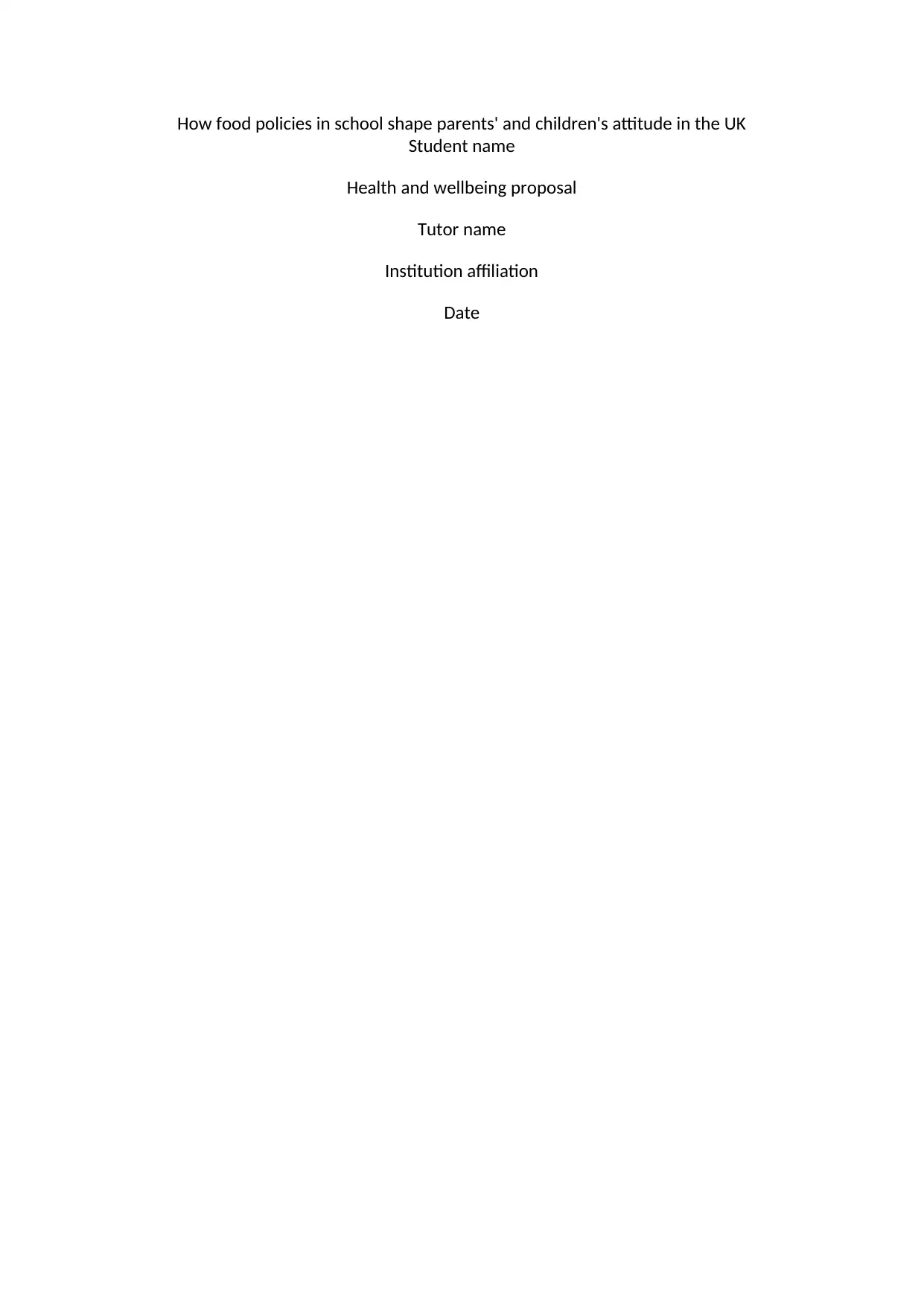
How food policies in school shape parents' and children's attitude in the UK
Student name
Health and wellbeing proposal
Tutor name
Institution affiliation
Date
Student name
Health and wellbeing proposal
Tutor name
Institution affiliation
Date
Secure Best Marks with AI Grader
Need help grading? Try our AI Grader for instant feedback on your assignments.

Table of Contents
Background 3
Theoretical framework 4
Statement of the problem 4
Research question 4
The aim of the study 5
Objectives of the study 5
Rationale of the study…………………………………………………………………..5
Research design………………………………………………………………………….6
Target population………………………………………………………………………………6
Inclusion and exclusion criteria……………………………………………………..…6
Sampling techniques and sample size……………………………………………………………………………..6
Data collection method…………………………………………………………………6
Data analysis technique……………………………………………………………………………………7
Scope and limitation of the study….…………………………………………………………………………………7
Ethical issues……………………………………………………………………………………...8
Reference………………………………………………………………………………….9
Appendixes……………………………………………………………………………….11
Background 3
Theoretical framework 4
Statement of the problem 4
Research question 4
The aim of the study 5
Objectives of the study 5
Rationale of the study…………………………………………………………………..5
Research design………………………………………………………………………….6
Target population………………………………………………………………………………6
Inclusion and exclusion criteria……………………………………………………..…6
Sampling techniques and sample size……………………………………………………………………………..6
Data collection method…………………………………………………………………6
Data analysis technique……………………………………………………………………………………7
Scope and limitation of the study….…………………………………………………………………………………7
Ethical issues……………………………………………………………………………………...8
Reference………………………………………………………………………………….9
Appendixes……………………………………………………………………………….11
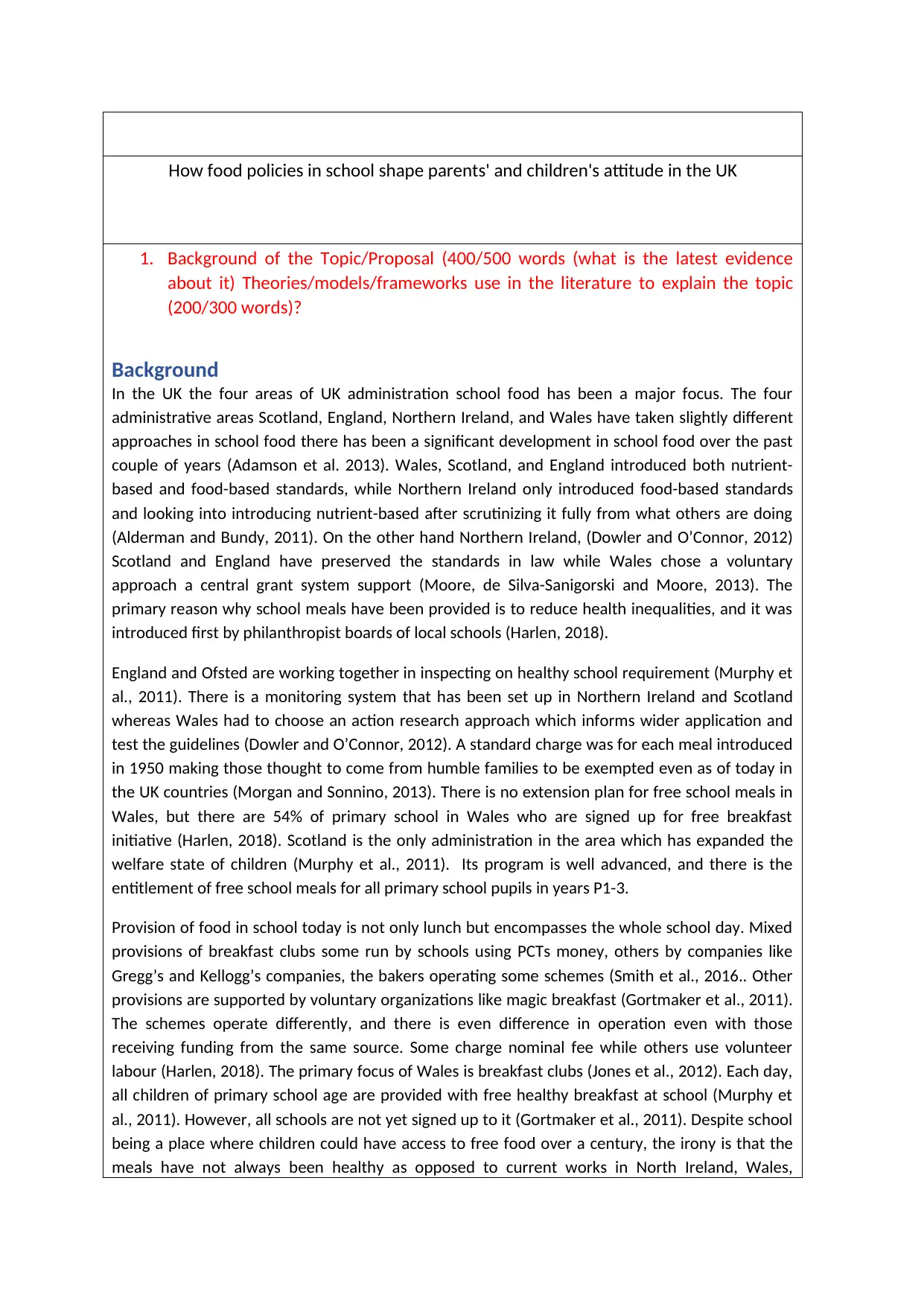
How food policies in school shape parents' and children's attitude in the UK
1. Background of the Topic/Proposal (400/500 words (what is the latest evidence
about it) Theories/models/frameworks use in the literature to explain the topic
(200/300 words)?
Background
In the UK the four areas of UK administration school food has been a major focus. The four
administrative areas Scotland, England, Northern Ireland, and Wales have taken slightly different
approaches in school food there has been a significant development in school food over the past
couple of years (Adamson et al. 2013). Wales, Scotland, and England introduced both nutrient-
based and food-based standards, while Northern Ireland only introduced food-based standards
and looking into introducing nutrient-based after scrutinizing it fully from what others are doing
(Alderman and Bundy, 2011). On the other hand Northern Ireland, (Dowler and O’Connor, 2012)
Scotland and England have preserved the standards in law while Wales chose a voluntary
approach a central grant system support (Moore, de Silva-Sanigorski and Moore, 2013). The
primary reason why school meals have been provided is to reduce health inequalities, and it was
introduced first by philanthropist boards of local schools (Harlen, 2018).
England and Ofsted are working together in inspecting on healthy school requirement (Murphy et
al., 2011). There is a monitoring system that has been set up in Northern Ireland and Scotland
whereas Wales had to choose an action research approach which informs wider application and
test the guidelines (Dowler and O’Connor, 2012). A standard charge was for each meal introduced
in 1950 making those thought to come from humble families to be exempted even as of today in
the UK countries (Morgan and Sonnino, 2013). There is no extension plan for free school meals in
Wales, but there are 54% of primary school in Wales who are signed up for free breakfast
initiative (Harlen, 2018). Scotland is the only administration in the area which has expanded the
welfare state of children (Murphy et al., 2011). Its program is well advanced, and there is the
entitlement of free school meals for all primary school pupils in years P1-3.
Provision of food in school today is not only lunch but encompasses the whole school day. Mixed
provisions of breakfast clubs some run by schools using PCTs money, others by companies like
Gregg’s and Kellogg’s companies, the bakers operating some schemes (Smith et al., 2016.. Other
provisions are supported by voluntary organizations like magic breakfast (Gortmaker et al., 2011).
The schemes operate differently, and there is even difference in operation even with those
receiving funding from the same source. Some charge nominal fee while others use volunteer
labour (Harlen, 2018). The primary focus of Wales is breakfast clubs (Jones et al., 2012). Each day,
all children of primary school age are provided with free healthy breakfast at school (Murphy et
al., 2011). However, all schools are not yet signed up to it (Gortmaker et al., 2011). Despite school
being a place where children could have access to free food over a century, the irony is that the
meals have not always been healthy as opposed to current works in North Ireland, Wales,
1. Background of the Topic/Proposal (400/500 words (what is the latest evidence
about it) Theories/models/frameworks use in the literature to explain the topic
(200/300 words)?
Background
In the UK the four areas of UK administration school food has been a major focus. The four
administrative areas Scotland, England, Northern Ireland, and Wales have taken slightly different
approaches in school food there has been a significant development in school food over the past
couple of years (Adamson et al. 2013). Wales, Scotland, and England introduced both nutrient-
based and food-based standards, while Northern Ireland only introduced food-based standards
and looking into introducing nutrient-based after scrutinizing it fully from what others are doing
(Alderman and Bundy, 2011). On the other hand Northern Ireland, (Dowler and O’Connor, 2012)
Scotland and England have preserved the standards in law while Wales chose a voluntary
approach a central grant system support (Moore, de Silva-Sanigorski and Moore, 2013). The
primary reason why school meals have been provided is to reduce health inequalities, and it was
introduced first by philanthropist boards of local schools (Harlen, 2018).
England and Ofsted are working together in inspecting on healthy school requirement (Murphy et
al., 2011). There is a monitoring system that has been set up in Northern Ireland and Scotland
whereas Wales had to choose an action research approach which informs wider application and
test the guidelines (Dowler and O’Connor, 2012). A standard charge was for each meal introduced
in 1950 making those thought to come from humble families to be exempted even as of today in
the UK countries (Morgan and Sonnino, 2013). There is no extension plan for free school meals in
Wales, but there are 54% of primary school in Wales who are signed up for free breakfast
initiative (Harlen, 2018). Scotland is the only administration in the area which has expanded the
welfare state of children (Murphy et al., 2011). Its program is well advanced, and there is the
entitlement of free school meals for all primary school pupils in years P1-3.
Provision of food in school today is not only lunch but encompasses the whole school day. Mixed
provisions of breakfast clubs some run by schools using PCTs money, others by companies like
Gregg’s and Kellogg’s companies, the bakers operating some schemes (Smith et al., 2016.. Other
provisions are supported by voluntary organizations like magic breakfast (Gortmaker et al., 2011).
The schemes operate differently, and there is even difference in operation even with those
receiving funding from the same source. Some charge nominal fee while others use volunteer
labour (Harlen, 2018). The primary focus of Wales is breakfast clubs (Jones et al., 2012). Each day,
all children of primary school age are provided with free healthy breakfast at school (Murphy et
al., 2011). However, all schools are not yet signed up to it (Gortmaker et al., 2011). Despite school
being a place where children could have access to free food over a century, the irony is that the
meals have not always been healthy as opposed to current works in North Ireland, Wales,

Scotland and England where the focus is on providing a balanced diet (Hawkes et al., 2015).
Theoretical Frameworks
The main aim of this study is to carry out an investigation on how food policies in school shape
parents' and children's' attitude in the UK, a case study of Aberdeen city, Scotland. The study will
adopt ‘Cognitive Dissonance theory' (Cooper, 2011). This theory asserts that individuals tend to
seek consistency amidst their cognitions, i.e. opinions and beliefs. Something must change when
there is an Inconsistency between behaviours and attitudes (dissonance) to eliminate dissonance
(Kim, 2011). If there is discrepancy concerning behaviour and attitudes, most likely the attitude
will change to accommodate the behavior (Kim, 2011). When an individual is obliged to choose
between mismatched actions or beliefs dissonance is most likely to occur. When two substitutes
attract, equally the greatest dissonance is created (Cooper, 2011). More importantly, an attitude is
likely to reshape if the direction has less motivations as this ends in lower dissonance (Cooper,
2011). This gives the reason why dissonance theory contradicts in most theories of behaviours
that predict greater attitude change as a result of increased incentive.
This theory applies to situations where there are change and attitude formation. It is more
applicable when solving problems and making decisions.
2. The topic of the LR (one statement 30/40 words) and the Research Question (20-
30 words) guiding this LR.
The statement of the problem
Policies concerning school food are an important issue for both parent and their children as some
parents would want the restriction of availability of snacks and soft drinks in school meals
(Hawkes et al., 2015). The parent would appreciate them replaced with fruits which are not
always available in school.
Research question
What are the food policy factors that affect parents’ attitudes and consideration when choosing a
school they want their children to study?
Theoretical Frameworks
The main aim of this study is to carry out an investigation on how food policies in school shape
parents' and children's' attitude in the UK, a case study of Aberdeen city, Scotland. The study will
adopt ‘Cognitive Dissonance theory' (Cooper, 2011). This theory asserts that individuals tend to
seek consistency amidst their cognitions, i.e. opinions and beliefs. Something must change when
there is an Inconsistency between behaviours and attitudes (dissonance) to eliminate dissonance
(Kim, 2011). If there is discrepancy concerning behaviour and attitudes, most likely the attitude
will change to accommodate the behavior (Kim, 2011). When an individual is obliged to choose
between mismatched actions or beliefs dissonance is most likely to occur. When two substitutes
attract, equally the greatest dissonance is created (Cooper, 2011). More importantly, an attitude is
likely to reshape if the direction has less motivations as this ends in lower dissonance (Cooper,
2011). This gives the reason why dissonance theory contradicts in most theories of behaviours
that predict greater attitude change as a result of increased incentive.
This theory applies to situations where there are change and attitude formation. It is more
applicable when solving problems and making decisions.
2. The topic of the LR (one statement 30/40 words) and the Research Question (20-
30 words) guiding this LR.
The statement of the problem
Policies concerning school food are an important issue for both parent and their children as some
parents would want the restriction of availability of snacks and soft drinks in school meals
(Hawkes et al., 2015). The parent would appreciate them replaced with fruits which are not
always available in school.
Research question
What are the food policy factors that affect parents’ attitudes and consideration when choosing a
school they want their children to study?
Secure Best Marks with AI Grader
Need help grading? Try our AI Grader for instant feedback on your assignments.
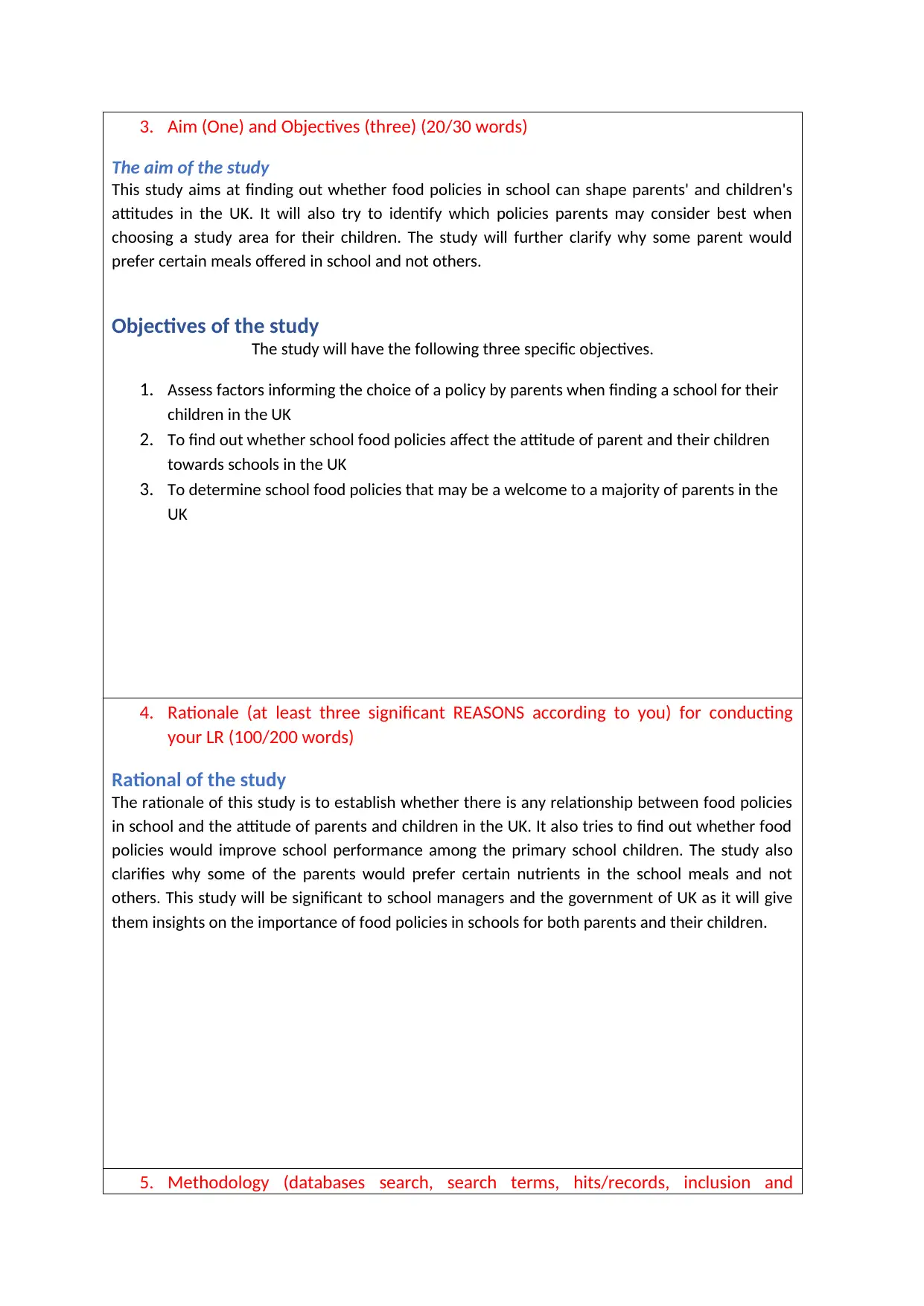
3. Aim (One) and Objectives (three) (20/30 words)
The aim of the study
This study aims at finding out whether food policies in school can shape parents' and children's
attitudes in the UK. It will also try to identify which policies parents may consider best when
choosing a study area for their children. The study will further clarify why some parent would
prefer certain meals offered in school and not others.
Objectives of the study
The study will have the following three specific objectives.
1. Assess factors informing the choice of a policy by parents when finding a school for their
children in the UK
2. To find out whether school food policies affect the attitude of parent and their children
towards schools in the UK
3. To determine school food policies that may be a welcome to a majority of parents in the
UK
4. Rationale (at least three significant REASONS according to you) for conducting
your LR (100/200 words)
Rational of the study
The rationale of this study is to establish whether there is any relationship between food policies
in school and the attitude of parents and children in the UK. It also tries to find out whether food
policies would improve school performance among the primary school children. The study also
clarifies why some of the parents would prefer certain nutrients in the school meals and not
others. This study will be significant to school managers and the government of UK as it will give
them insights on the importance of food policies in schools for both parents and their children.
5. Methodology (databases search, search terms, hits/records, inclusion and
The aim of the study
This study aims at finding out whether food policies in school can shape parents' and children's
attitudes in the UK. It will also try to identify which policies parents may consider best when
choosing a study area for their children. The study will further clarify why some parent would
prefer certain meals offered in school and not others.
Objectives of the study
The study will have the following three specific objectives.
1. Assess factors informing the choice of a policy by parents when finding a school for their
children in the UK
2. To find out whether school food policies affect the attitude of parent and their children
towards schools in the UK
3. To determine school food policies that may be a welcome to a majority of parents in the
UK
4. Rationale (at least three significant REASONS according to you) for conducting
your LR (100/200 words)
Rational of the study
The rationale of this study is to establish whether there is any relationship between food policies
in school and the attitude of parents and children in the UK. It also tries to find out whether food
policies would improve school performance among the primary school children. The study also
clarifies why some of the parents would prefer certain nutrients in the school meals and not
others. This study will be significant to school managers and the government of UK as it will give
them insights on the importance of food policies in schools for both parents and their children.
5. Methodology (databases search, search terms, hits/records, inclusion and

exclusion criteria, possible number of articles to be reviewed) 400/500 words.
Research design
This research will adapt survey study for parents whose children study at Scotland schools. This is
a data collection tool used to gather data information concerning individuals (De Vaus, 2013). This
tool collects self-report data from participants of the study. It will focus on factual information of
the individual or also obtain the opinion of the survey takers (De Vaus, 2013). This will be achieved
by asking a series of questions to a selected number of people and subsequently analyze the
questions after getting responses (Creswell and Creswell, 2017). This study tool can yield a reliable
result when it can ask people of information they do not consider personal or too confidential to
threaten their conscious and those they can find answers (Meade and Craig, 2012). Since the
respondents are expected to fill a questionnaire more candid answers would be expected
(Creswell and Creswell, 2017). The choice of this tool is based on considering its suitability in
comparison to other similar research studies (Meade and Craig, 2012). The study will further
cluster the population into 4 each cluster consisting of ten (10) parents whose children are in
different schools in Scotland (Smith, 2013). This method is justifiable as the respondents will be
given some questions to answer.
HITS/Records
The information will also be searched from diaries, letters, newspapers, internet,
academic books, school websites, reports, and all other related material publication as
sources of data. The focus will be on all the materials will possibility of having all the
information. All the data will be recorded for analysis in the future.
Target population
The population in this study will comprise of parents from Scotland more specifically 10 primary
schools in the city of Aberdeen whose children study in the local schools. The Scotland population
will be appropriate for this study since it has both parents and children who have signed up for
the school food program and those who have not signed up for the program in the schools. It also
has both nutrient-based and food-based standards.
Possible number of articles to be reviewed includes: Effectiveness of school food environment
policies on children's dietary behaviors: A systematic review and meta-analysis, Dietary guidelines
and health—is nutrition science up to the task?, and also Food consumption among ethnic
minorities: the case of British-Pakistanis in Bradford, UK, BY A. Jamal-British food journal, 1998.
Inclusion and exclusion criteria
The participant in the study must be parents who have their children going to primary
schools in any of the Scotland, Aberdeen city primary schools. They should either have
signed up to the school feeding program or not yet signed up. They will also involve both
private and public schools. Children who will be included I the study must be between 5
to 13 years of age. Both male and female parent and pupils will be allowed to participate
if they qualify for the above listed criteria.
Those will not be allowed to participate the study will be those parents who do not have
their children outside Aberdeen city primary schools. Children who do not go to school
Research design
This research will adapt survey study for parents whose children study at Scotland schools. This is
a data collection tool used to gather data information concerning individuals (De Vaus, 2013). This
tool collects self-report data from participants of the study. It will focus on factual information of
the individual or also obtain the opinion of the survey takers (De Vaus, 2013). This will be achieved
by asking a series of questions to a selected number of people and subsequently analyze the
questions after getting responses (Creswell and Creswell, 2017). This study tool can yield a reliable
result when it can ask people of information they do not consider personal or too confidential to
threaten their conscious and those they can find answers (Meade and Craig, 2012). Since the
respondents are expected to fill a questionnaire more candid answers would be expected
(Creswell and Creswell, 2017). The choice of this tool is based on considering its suitability in
comparison to other similar research studies (Meade and Craig, 2012). The study will further
cluster the population into 4 each cluster consisting of ten (10) parents whose children are in
different schools in Scotland (Smith, 2013). This method is justifiable as the respondents will be
given some questions to answer.
HITS/Records
The information will also be searched from diaries, letters, newspapers, internet,
academic books, school websites, reports, and all other related material publication as
sources of data. The focus will be on all the materials will possibility of having all the
information. All the data will be recorded for analysis in the future.
Target population
The population in this study will comprise of parents from Scotland more specifically 10 primary
schools in the city of Aberdeen whose children study in the local schools. The Scotland population
will be appropriate for this study since it has both parents and children who have signed up for
the school food program and those who have not signed up for the program in the schools. It also
has both nutrient-based and food-based standards.
Possible number of articles to be reviewed includes: Effectiveness of school food environment
policies on children's dietary behaviors: A systematic review and meta-analysis, Dietary guidelines
and health—is nutrition science up to the task?, and also Food consumption among ethnic
minorities: the case of British-Pakistanis in Bradford, UK, BY A. Jamal-British food journal, 1998.
Inclusion and exclusion criteria
The participant in the study must be parents who have their children going to primary
schools in any of the Scotland, Aberdeen city primary schools. They should either have
signed up to the school feeding program or not yet signed up. They will also involve both
private and public schools. Children who will be included I the study must be between 5
to 13 years of age. Both male and female parent and pupils will be allowed to participate
if they qualify for the above listed criteria.
Those will not be allowed to participate the study will be those parents who do not have
their children outside Aberdeen city primary schools. Children who do not go to school
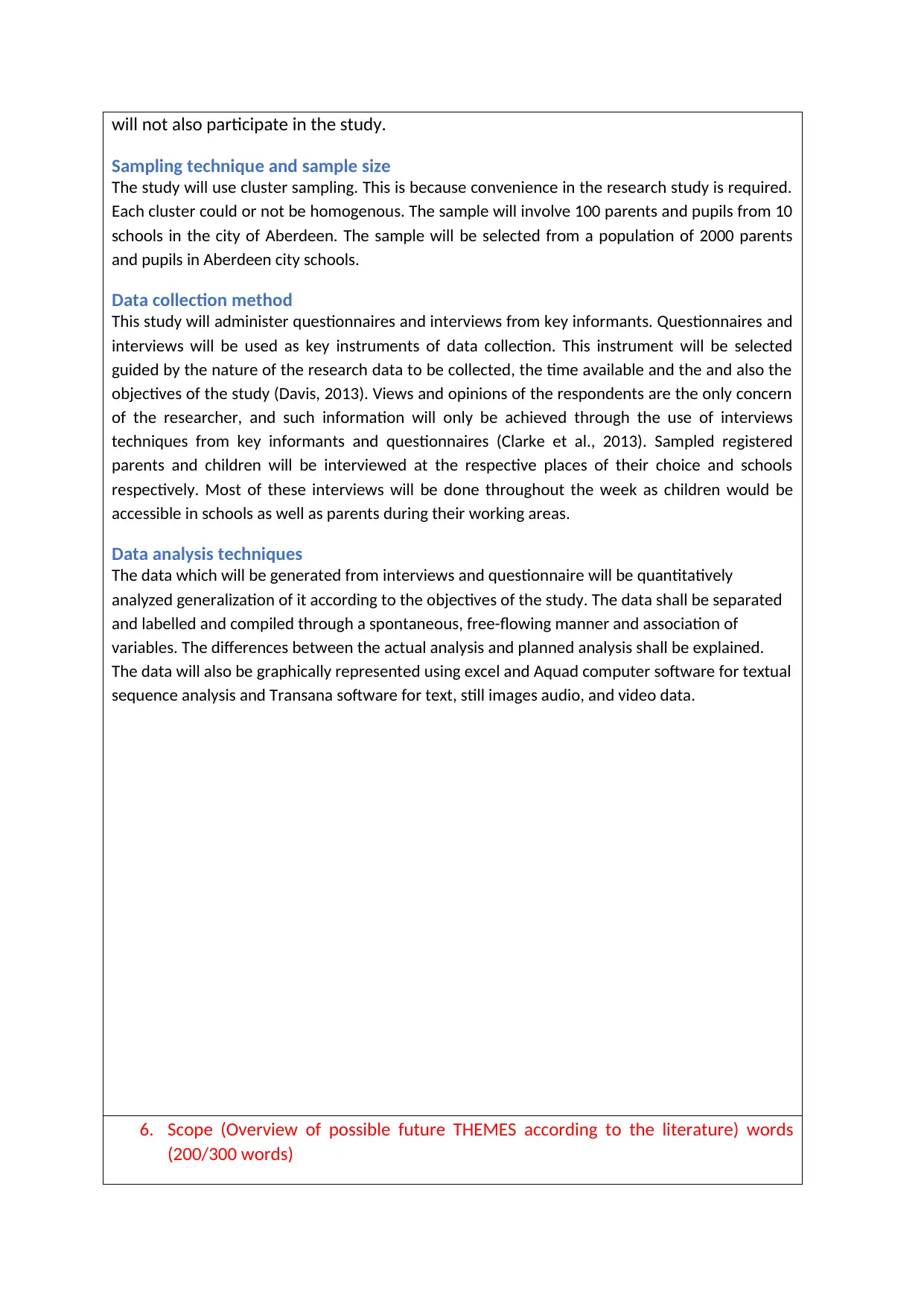
will not also participate in the study.
Sampling technique and sample size
The study will use cluster sampling. This is because convenience in the research study is required.
Each cluster could or not be homogenous. The sample will involve 100 parents and pupils from 10
schools in the city of Aberdeen. The sample will be selected from a population of 2000 parents
and pupils in Aberdeen city schools.
Data collection method
This study will administer questionnaires and interviews from key informants. Questionnaires and
interviews will be used as key instruments of data collection. This instrument will be selected
guided by the nature of the research data to be collected, the time available and the and also the
objectives of the study (Davis, 2013). Views and opinions of the respondents are the only concern
of the researcher, and such information will only be achieved through the use of interviews
techniques from key informants and questionnaires (Clarke et al., 2013). Sampled registered
parents and children will be interviewed at the respective places of their choice and schools
respectively. Most of these interviews will be done throughout the week as children would be
accessible in schools as well as parents during their working areas.
Data analysis techniques
The data which will be generated from interviews and questionnaire will be quantitatively
analyzed generalization of it according to the objectives of the study. The data shall be separated
and labelled and compiled through a spontaneous, free-flowing manner and association of
variables. The differences between the actual analysis and planned analysis shall be explained.
The data will also be graphically represented using excel and Aquad computer software for textual
sequence analysis and Transana software for text, still images audio, and video data.
6. Scope (Overview of possible future THEMES according to the literature) words
(200/300 words)
Sampling technique and sample size
The study will use cluster sampling. This is because convenience in the research study is required.
Each cluster could or not be homogenous. The sample will involve 100 parents and pupils from 10
schools in the city of Aberdeen. The sample will be selected from a population of 2000 parents
and pupils in Aberdeen city schools.
Data collection method
This study will administer questionnaires and interviews from key informants. Questionnaires and
interviews will be used as key instruments of data collection. This instrument will be selected
guided by the nature of the research data to be collected, the time available and the and also the
objectives of the study (Davis, 2013). Views and opinions of the respondents are the only concern
of the researcher, and such information will only be achieved through the use of interviews
techniques from key informants and questionnaires (Clarke et al., 2013). Sampled registered
parents and children will be interviewed at the respective places of their choice and schools
respectively. Most of these interviews will be done throughout the week as children would be
accessible in schools as well as parents during their working areas.
Data analysis techniques
The data which will be generated from interviews and questionnaire will be quantitatively
analyzed generalization of it according to the objectives of the study. The data shall be separated
and labelled and compiled through a spontaneous, free-flowing manner and association of
variables. The differences between the actual analysis and planned analysis shall be explained.
The data will also be graphically represented using excel and Aquad computer software for textual
sequence analysis and Transana software for text, still images audio, and video data.
6. Scope (Overview of possible future THEMES according to the literature) words
(200/300 words)
Paraphrase This Document
Need a fresh take? Get an instant paraphrase of this document with our AI Paraphraser
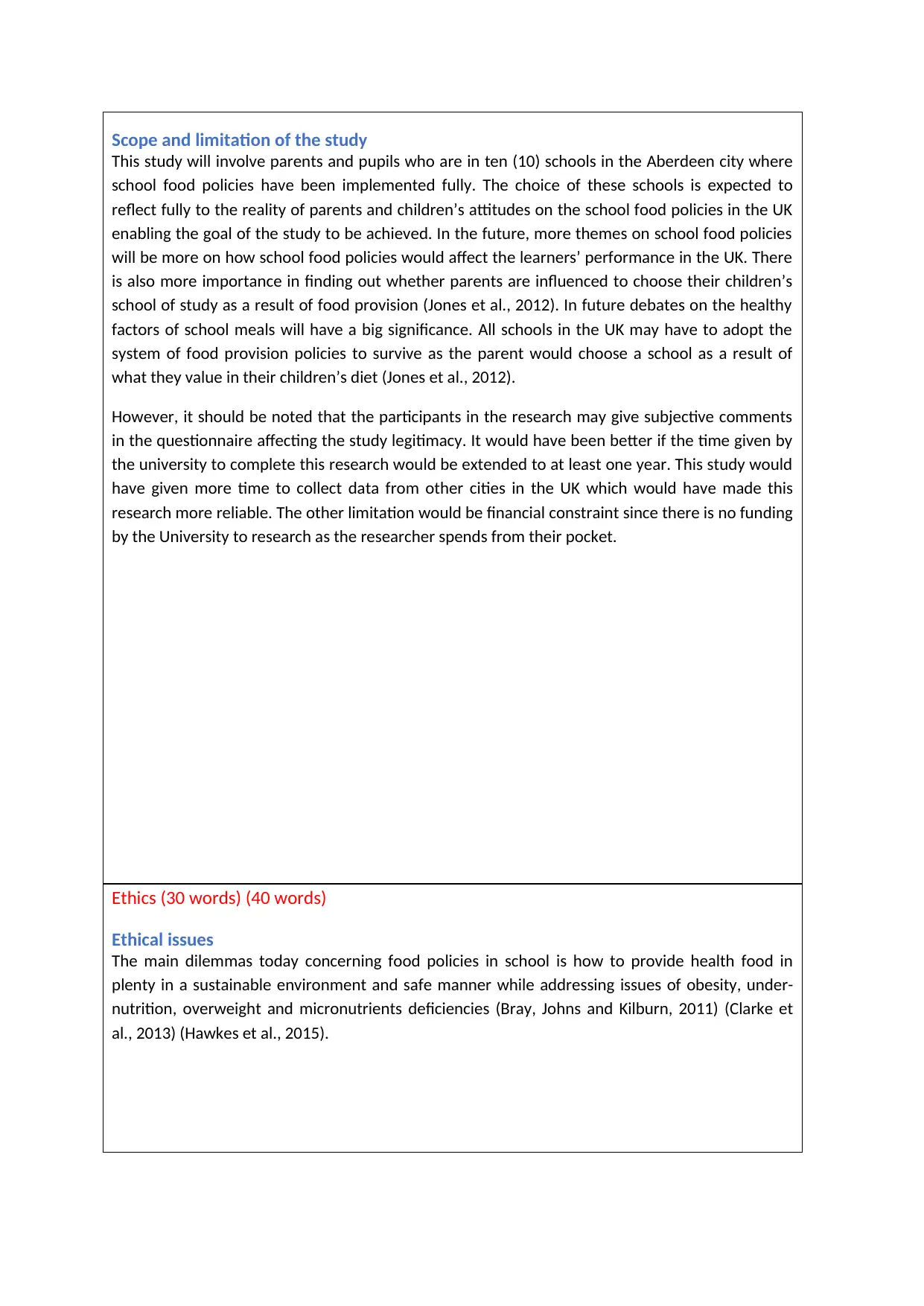
Scope and limitation of the study
This study will involve parents and pupils who are in ten (10) schools in the Aberdeen city where
school food policies have been implemented fully. The choice of these schools is expected to
reflect fully to the reality of parents and children’s attitudes on the school food policies in the UK
enabling the goal of the study to be achieved. In the future, more themes on school food policies
will be more on how school food policies would affect the learners’ performance in the UK. There
is also more importance in finding out whether parents are influenced to choose their children’s
school of study as a result of food provision (Jones et al., 2012). In future debates on the healthy
factors of school meals will have a big significance. All schools in the UK may have to adopt the
system of food provision policies to survive as the parent would choose a school as a result of
what they value in their children’s diet (Jones et al., 2012).
However, it should be noted that the participants in the research may give subjective comments
in the questionnaire affecting the study legitimacy. It would have been better if the time given by
the university to complete this research would be extended to at least one year. This study would
have given more time to collect data from other cities in the UK which would have made this
research more reliable. The other limitation would be financial constraint since there is no funding
by the University to research as the researcher spends from their pocket.
Ethics (30 words) (40 words)
Ethical issues
The main dilemmas today concerning food policies in school is how to provide health food in
plenty in a sustainable environment and safe manner while addressing issues of obesity, under-
nutrition, overweight and micronutrients deficiencies (Bray, Johns and Kilburn, 2011) (Clarke et
al., 2013) (Hawkes et al., 2015).
This study will involve parents and pupils who are in ten (10) schools in the Aberdeen city where
school food policies have been implemented fully. The choice of these schools is expected to
reflect fully to the reality of parents and children’s attitudes on the school food policies in the UK
enabling the goal of the study to be achieved. In the future, more themes on school food policies
will be more on how school food policies would affect the learners’ performance in the UK. There
is also more importance in finding out whether parents are influenced to choose their children’s
school of study as a result of food provision (Jones et al., 2012). In future debates on the healthy
factors of school meals will have a big significance. All schools in the UK may have to adopt the
system of food provision policies to survive as the parent would choose a school as a result of
what they value in their children’s diet (Jones et al., 2012).
However, it should be noted that the participants in the research may give subjective comments
in the questionnaire affecting the study legitimacy. It would have been better if the time given by
the university to complete this research would be extended to at least one year. This study would
have given more time to collect data from other cities in the UK which would have made this
research more reliable. The other limitation would be financial constraint since there is no funding
by the University to research as the researcher spends from their pocket.
Ethics (30 words) (40 words)
Ethical issues
The main dilemmas today concerning food policies in school is how to provide health food in
plenty in a sustainable environment and safe manner while addressing issues of obesity, under-
nutrition, overweight and micronutrients deficiencies (Bray, Johns and Kilburn, 2011) (Clarke et
al., 2013) (Hawkes et al., 2015).
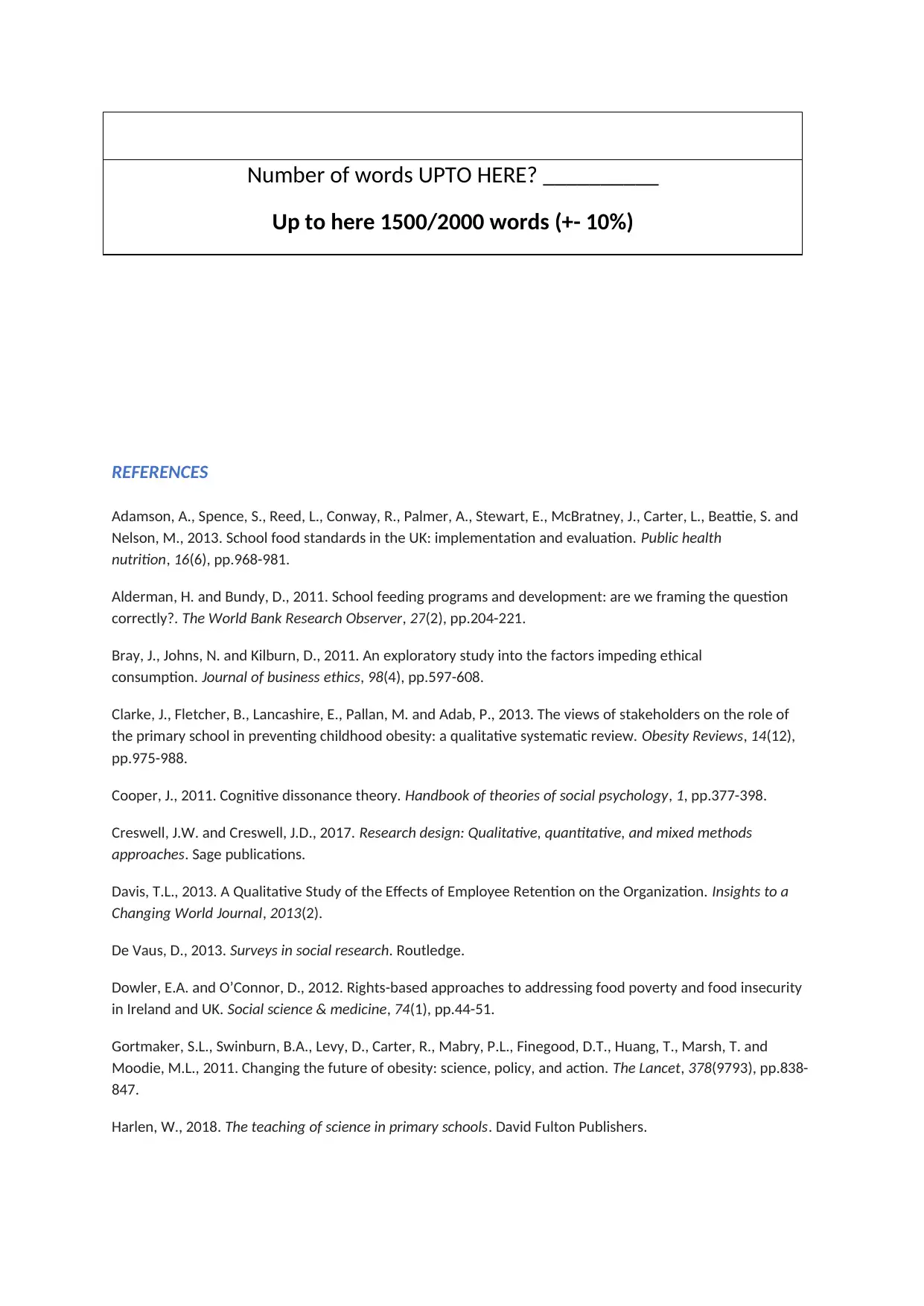
Number of words UPTO HERE? __________
Up to here 1500/2000 words (+- 10%)
REFERENCES
Adamson, A., Spence, S., Reed, L., Conway, R., Palmer, A., Stewart, E., McBratney, J., Carter, L., Beattie, S. and
Nelson, M., 2013. School food standards in the UK: implementation and evaluation. Public health
nutrition, 16(6), pp.968-981.
Alderman, H. and Bundy, D., 2011. School feeding programs and development: are we framing the question
correctly?. The World Bank Research Observer, 27(2), pp.204-221.
Bray, J., Johns, N. and Kilburn, D., 2011. An exploratory study into the factors impeding ethical
consumption. Journal of business ethics, 98(4), pp.597-608.
Clarke, J., Fletcher, B., Lancashire, E., Pallan, M. and Adab, P., 2013. The views of stakeholders on the role of
the primary school in preventing childhood obesity: a qualitative systematic review. Obesity Reviews, 14(12),
pp.975-988.
Cooper, J., 2011. Cognitive dissonance theory. Handbook of theories of social psychology, 1, pp.377-398.
Creswell, J.W. and Creswell, J.D., 2017. Research design: Qualitative, quantitative, and mixed methods
approaches. Sage publications.
Davis, T.L., 2013. A Qualitative Study of the Effects of Employee Retention on the Organization. Insights to a
Changing World Journal, 2013(2).
De Vaus, D., 2013. Surveys in social research. Routledge.
Dowler, E.A. and O’Connor, D., 2012. Rights-based approaches to addressing food poverty and food insecurity
in Ireland and UK. Social science & medicine, 74(1), pp.44-51.
Gortmaker, S.L., Swinburn, B.A., Levy, D., Carter, R., Mabry, P.L., Finegood, D.T., Huang, T., Marsh, T. and
Moodie, M.L., 2011. Changing the future of obesity: science, policy, and action. The Lancet, 378(9793), pp.838-
847.
Harlen, W., 2018. The teaching of science in primary schools. David Fulton Publishers.
Up to here 1500/2000 words (+- 10%)
REFERENCES
Adamson, A., Spence, S., Reed, L., Conway, R., Palmer, A., Stewart, E., McBratney, J., Carter, L., Beattie, S. and
Nelson, M., 2013. School food standards in the UK: implementation and evaluation. Public health
nutrition, 16(6), pp.968-981.
Alderman, H. and Bundy, D., 2011. School feeding programs and development: are we framing the question
correctly?. The World Bank Research Observer, 27(2), pp.204-221.
Bray, J., Johns, N. and Kilburn, D., 2011. An exploratory study into the factors impeding ethical
consumption. Journal of business ethics, 98(4), pp.597-608.
Clarke, J., Fletcher, B., Lancashire, E., Pallan, M. and Adab, P., 2013. The views of stakeholders on the role of
the primary school in preventing childhood obesity: a qualitative systematic review. Obesity Reviews, 14(12),
pp.975-988.
Cooper, J., 2011. Cognitive dissonance theory. Handbook of theories of social psychology, 1, pp.377-398.
Creswell, J.W. and Creswell, J.D., 2017. Research design: Qualitative, quantitative, and mixed methods
approaches. Sage publications.
Davis, T.L., 2013. A Qualitative Study of the Effects of Employee Retention on the Organization. Insights to a
Changing World Journal, 2013(2).
De Vaus, D., 2013. Surveys in social research. Routledge.
Dowler, E.A. and O’Connor, D., 2012. Rights-based approaches to addressing food poverty and food insecurity
in Ireland and UK. Social science & medicine, 74(1), pp.44-51.
Gortmaker, S.L., Swinburn, B.A., Levy, D., Carter, R., Mabry, P.L., Finegood, D.T., Huang, T., Marsh, T. and
Moodie, M.L., 2011. Changing the future of obesity: science, policy, and action. The Lancet, 378(9793), pp.838-
847.
Harlen, W., 2018. The teaching of science in primary schools. David Fulton Publishers.
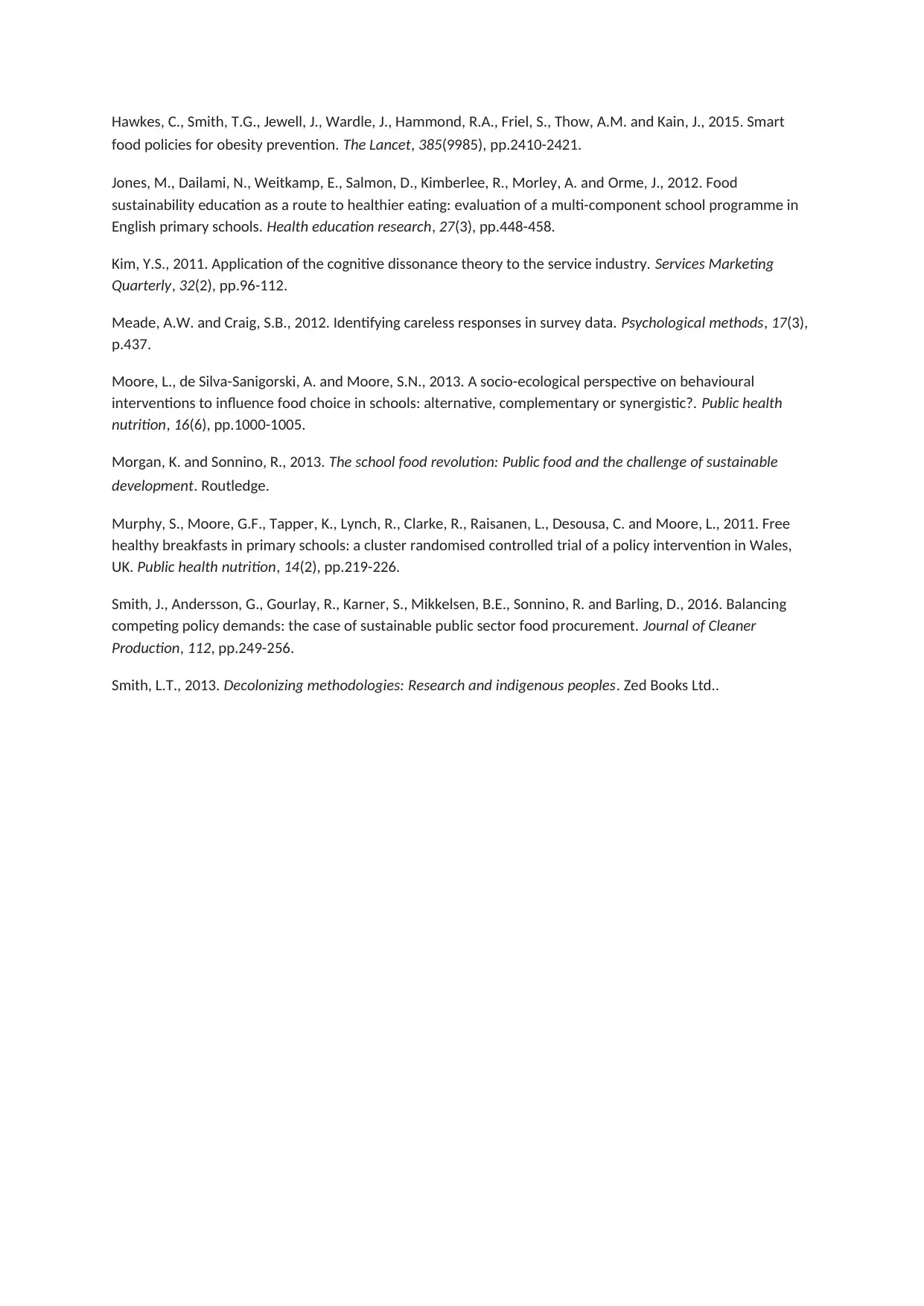
Hawkes, C., Smith, T.G., Jewell, J., Wardle, J., Hammond, R.A., Friel, S., Thow, A.M. and Kain, J., 2015. Smart
food policies for obesity prevention. The Lancet, 385(9985), pp.2410-2421.
Jones, M., Dailami, N., Weitkamp, E., Salmon, D., Kimberlee, R., Morley, A. and Orme, J., 2012. Food
sustainability education as a route to healthier eating: evaluation of a multi-component school programme in
English primary schools. Health education research, 27(3), pp.448-458.
Kim, Y.S., 2011. Application of the cognitive dissonance theory to the service industry. Services Marketing
Quarterly, 32(2), pp.96-112.
Meade, A.W. and Craig, S.B., 2012. Identifying careless responses in survey data. Psychological methods, 17(3),
p.437.
Moore, L., de Silva-Sanigorski, A. and Moore, S.N., 2013. A socio-ecological perspective on behavioural
interventions to influence food choice in schools: alternative, complementary or synergistic?. Public health
nutrition, 16(6), pp.1000-1005.
Morgan, K. and Sonnino, R., 2013. The school food revolution: Public food and the challenge of sustainable
development. Routledge.
Murphy, S., Moore, G.F., Tapper, K., Lynch, R., Clarke, R., Raisanen, L., Desousa, C. and Moore, L., 2011. Free
healthy breakfasts in primary schools: a cluster randomised controlled trial of a policy intervention in Wales,
UK. Public health nutrition, 14(2), pp.219-226.
Smith, J., Andersson, G., Gourlay, R., Karner, S., Mikkelsen, B.E., Sonnino, R. and Barling, D., 2016. Balancing
competing policy demands: the case of sustainable public sector food procurement. Journal of Cleaner
Production, 112, pp.249-256.
Smith, L.T., 2013. Decolonizing methodologies: Research and indigenous peoples. Zed Books Ltd..
food policies for obesity prevention. The Lancet, 385(9985), pp.2410-2421.
Jones, M., Dailami, N., Weitkamp, E., Salmon, D., Kimberlee, R., Morley, A. and Orme, J., 2012. Food
sustainability education as a route to healthier eating: evaluation of a multi-component school programme in
English primary schools. Health education research, 27(3), pp.448-458.
Kim, Y.S., 2011. Application of the cognitive dissonance theory to the service industry. Services Marketing
Quarterly, 32(2), pp.96-112.
Meade, A.W. and Craig, S.B., 2012. Identifying careless responses in survey data. Psychological methods, 17(3),
p.437.
Moore, L., de Silva-Sanigorski, A. and Moore, S.N., 2013. A socio-ecological perspective on behavioural
interventions to influence food choice in schools: alternative, complementary or synergistic?. Public health
nutrition, 16(6), pp.1000-1005.
Morgan, K. and Sonnino, R., 2013. The school food revolution: Public food and the challenge of sustainable
development. Routledge.
Murphy, S., Moore, G.F., Tapper, K., Lynch, R., Clarke, R., Raisanen, L., Desousa, C. and Moore, L., 2011. Free
healthy breakfasts in primary schools: a cluster randomised controlled trial of a policy intervention in Wales,
UK. Public health nutrition, 14(2), pp.219-226.
Smith, J., Andersson, G., Gourlay, R., Karner, S., Mikkelsen, B.E., Sonnino, R. and Barling, D., 2016. Balancing
competing policy demands: the case of sustainable public sector food procurement. Journal of Cleaner
Production, 112, pp.249-256.
Smith, L.T., 2013. Decolonizing methodologies: Research and indigenous peoples. Zed Books Ltd..
Secure Best Marks with AI Grader
Need help grading? Try our AI Grader for instant feedback on your assignments.
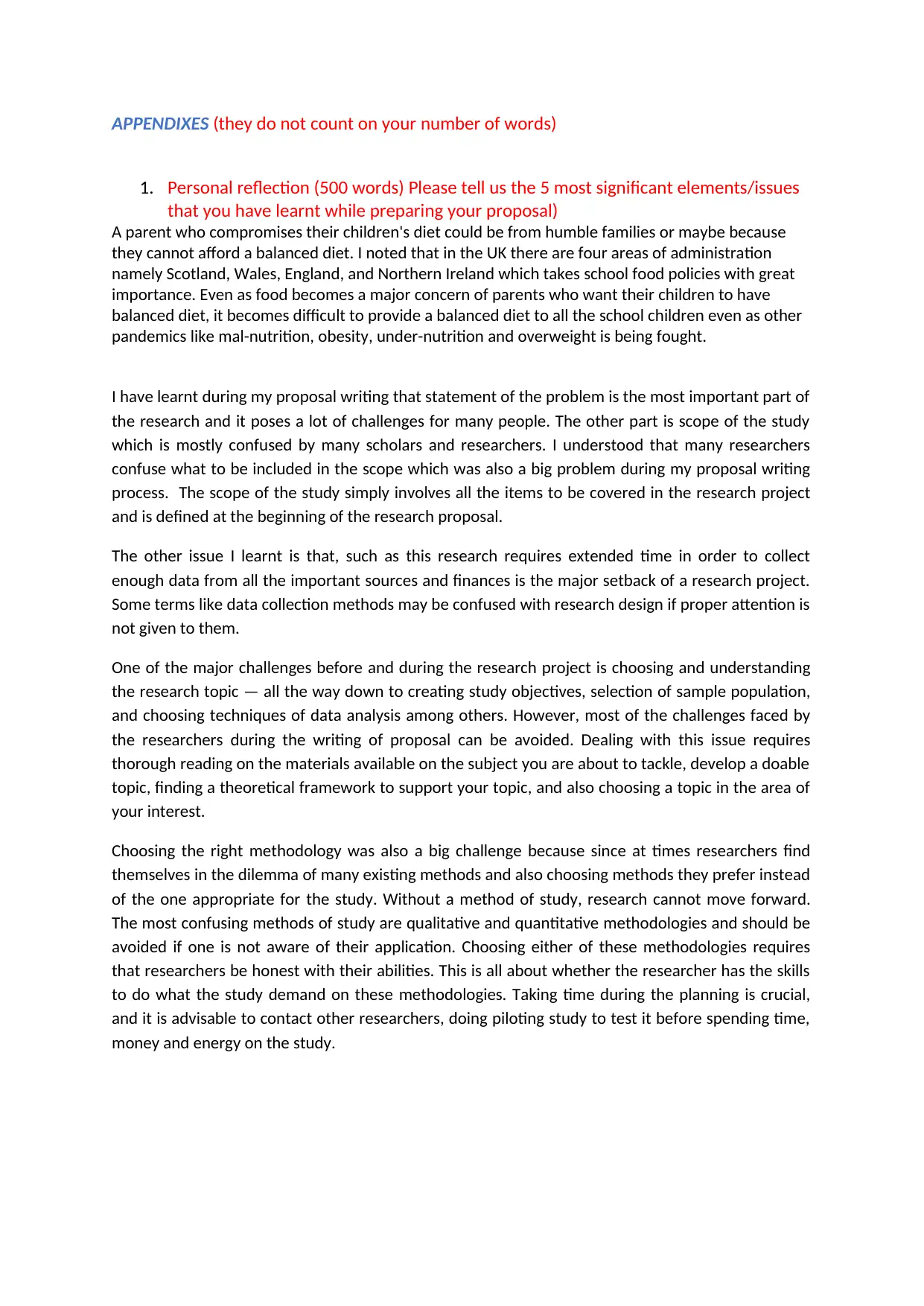
APPENDIXES (they do not count on your number of words)
1. Personal reflection (500 words) Please tell us the 5 most significant elements/issues
that you have learnt while preparing your proposal)
A parent who compromises their children's diet could be from humble families or maybe because
they cannot afford a balanced diet. I noted that in the UK there are four areas of administration
namely Scotland, Wales, England, and Northern Ireland which takes school food policies with great
importance. Even as food becomes a major concern of parents who want their children to have
balanced diet, it becomes difficult to provide a balanced diet to all the school children even as other
pandemics like mal-nutrition, obesity, under-nutrition and overweight is being fought.
I have learnt during my proposal writing that statement of the problem is the most important part of
the research and it poses a lot of challenges for many people. The other part is scope of the study
which is mostly confused by many scholars and researchers. I understood that many researchers
confuse what to be included in the scope which was also a big problem during my proposal writing
process. The scope of the study simply involves all the items to be covered in the research project
and is defined at the beginning of the research proposal.
The other issue I learnt is that, such as this research requires extended time in order to collect
enough data from all the important sources and finances is the major setback of a research project.
Some terms like data collection methods may be confused with research design if proper attention is
not given to them.
One of the major challenges before and during the research project is choosing and understanding
the research topic — all the way down to creating study objectives, selection of sample population,
and choosing techniques of data analysis among others. However, most of the challenges faced by
the researchers during the writing of proposal can be avoided. Dealing with this issue requires
thorough reading on the materials available on the subject you are about to tackle, develop a doable
topic, finding a theoretical framework to support your topic, and also choosing a topic in the area of
your interest.
Choosing the right methodology was also a big challenge because since at times researchers find
themselves in the dilemma of many existing methods and also choosing methods they prefer instead
of the one appropriate for the study. Without a method of study, research cannot move forward.
The most confusing methods of study are qualitative and quantitative methodologies and should be
avoided if one is not aware of their application. Choosing either of these methodologies requires
that researchers be honest with their abilities. This is all about whether the researcher has the skills
to do what the study demand on these methodologies. Taking time during the planning is crucial,
and it is advisable to contact other researchers, doing piloting study to test it before spending time,
money and energy on the study.
1. Personal reflection (500 words) Please tell us the 5 most significant elements/issues
that you have learnt while preparing your proposal)
A parent who compromises their children's diet could be from humble families or maybe because
they cannot afford a balanced diet. I noted that in the UK there are four areas of administration
namely Scotland, Wales, England, and Northern Ireland which takes school food policies with great
importance. Even as food becomes a major concern of parents who want their children to have
balanced diet, it becomes difficult to provide a balanced diet to all the school children even as other
pandemics like mal-nutrition, obesity, under-nutrition and overweight is being fought.
I have learnt during my proposal writing that statement of the problem is the most important part of
the research and it poses a lot of challenges for many people. The other part is scope of the study
which is mostly confused by many scholars and researchers. I understood that many researchers
confuse what to be included in the scope which was also a big problem during my proposal writing
process. The scope of the study simply involves all the items to be covered in the research project
and is defined at the beginning of the research proposal.
The other issue I learnt is that, such as this research requires extended time in order to collect
enough data from all the important sources and finances is the major setback of a research project.
Some terms like data collection methods may be confused with research design if proper attention is
not given to them.
One of the major challenges before and during the research project is choosing and understanding
the research topic — all the way down to creating study objectives, selection of sample population,
and choosing techniques of data analysis among others. However, most of the challenges faced by
the researchers during the writing of proposal can be avoided. Dealing with this issue requires
thorough reading on the materials available on the subject you are about to tackle, develop a doable
topic, finding a theoretical framework to support your topic, and also choosing a topic in the area of
your interest.
Choosing the right methodology was also a big challenge because since at times researchers find
themselves in the dilemma of many existing methods and also choosing methods they prefer instead
of the one appropriate for the study. Without a method of study, research cannot move forward.
The most confusing methods of study are qualitative and quantitative methodologies and should be
avoided if one is not aware of their application. Choosing either of these methodologies requires
that researchers be honest with their abilities. This is all about whether the researcher has the skills
to do what the study demand on these methodologies. Taking time during the planning is crucial,
and it is advisable to contact other researchers, doing piloting study to test it before spending time,
money and energy on the study.
1 out of 11
Related Documents
Your All-in-One AI-Powered Toolkit for Academic Success.
+13062052269
info@desklib.com
Available 24*7 on WhatsApp / Email
![[object Object]](/_next/static/media/star-bottom.7253800d.svg)
Unlock your academic potential
© 2024 | Zucol Services PVT LTD | All rights reserved.
